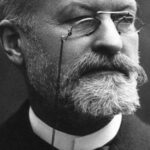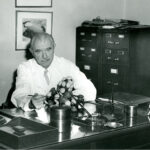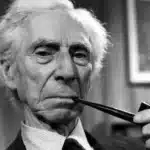George Porter (6 December 1920 – 31 August 2002) was a British chemist. He received the Nobel Prize in Chemistry.
Life and Career
George Porter was born on 6 December 1920, in Stainforth, United Kingdom.
He displayed an early interest in science, which led him to study chemistry at the University of Leeds. His academic prowess was evident from the beginning, and he quickly gained recognition for his dedication and curiosity in the laboratory.
Porter’s career took off after completing his doctoral studies. He focused on the study of photochemical reactions, particularly those related to the interaction of light with molecules. His groundbreaking research into the dynamics of molecular processes initiated by light earned him the Nobel Prize in Chemistry in 1967, alongside Manfred Eigen and Ronald Norrish.
Porter’s research not only contributed to a deeper understanding of chemical reactions triggered by light but also paved the way for various applications in fields such as photography, photobiology, and photomedicine. His work had a profound impact on advancing our knowledge of how molecules behave in the presence of light.
George Porter passed away on 31 August 2002, in Canterbury, United Kingdom.
Award and Legacy
He received the Nobel Prize in Chemistry, which he was awarded in 1967.
Beyond his Nobel Prize, George Porter received numerous accolades and awards for his scientific contributions. His legacy lives on through the research he conducted and the students he mentored. Many scientists were inspired by his work and followed in his footsteps, further expanding the field of photochemistry.
Porter’s contributions also had a lasting impact on education and scientific outreach. He was a strong advocate for promoting science education and increasing public understanding of chemistry. His efforts helped bridge the gap between the scientific community and the general public.
Tags: 31 August 2002, 6 December 1920, a British chemist, Award for George Porter, Career of George Porter, FAQ on George Porter George Porter, George Porter, George Porter 's Birthday, George Porter Birthday, George Porter Death anniversary, George Porter Observer Voice, Legacy of George Porter, Life of George Porter, Nobel Prize Laureate, Observer Voice George Porter, Tribute to George Porter











